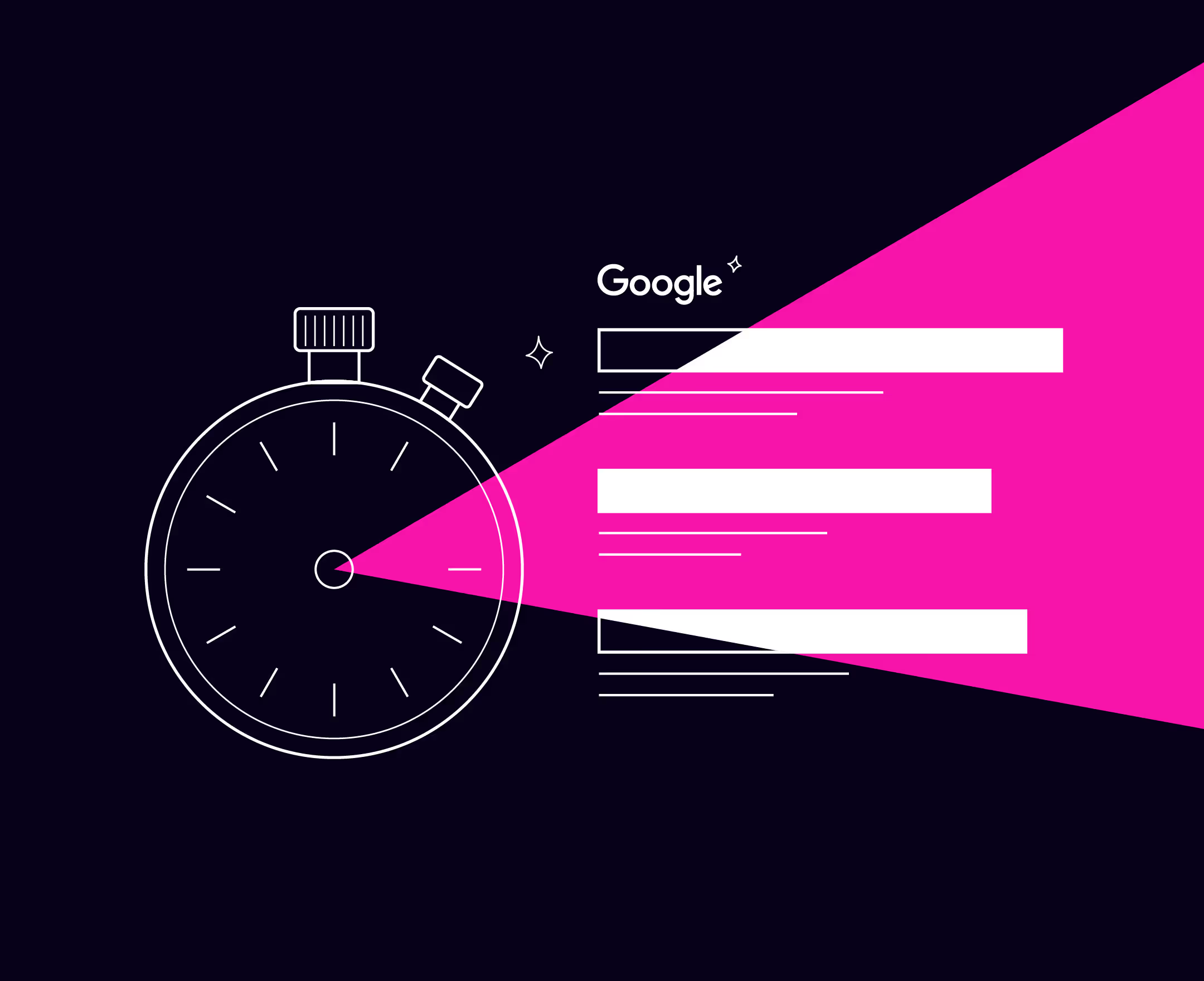Developing a solid SEO (search engine optimization) strategy is crucial for building visibility in search results, but you have to keep in mind that it’s a long game. You won’t rank overnight — or even in 30 days — regardless of how well you choose your keywords and how high your domain authority is. Your SEO efforts will have a snowball effect on traffic and visitors over time. If someone (an SEO agency, for instance) promises you instant results — a top spot in a short time — consider that a red flag.
However, there are things you can do to help your pages rank faster. Google’s algorithm uses a set of criteria to determine which pages should sit at the top of SERPs (search engine results pages). Understanding how to meet these criteria can help your content rank higher.
How Long Does It Take to Rank? Here’s What the Data Says.
Google tends to index new pages quickly — usually within a week or two of them going live — but it takes more time for the search engine to decide whether a page should rank well for the keywords it’s targeting. In the SEO world, this period of limbo is known as “Google’s sandbox.” The sandbox is not an actual place or designation; rather, it’s the name given to a set of algorithms that determine the rankings of new webpages, and these algorithms take time to do their thing. During this digital probationary period, Google tests new pages out in search results. Waiting for Google to reach a conclusion can be frustrating if you want to see the fruits of your labor ASAP.
Most SEO professionals suggest that it takes three to six months for a new website to start ranking in search results. But it can take much longer, depending on the quality of your content and the difficulty of the keywords you’re targeting. If you’re targeting a popular keyword with strong competition and a high search volume, it can take up to 12 months to start seeing results.
Positional co-founder Nate Matherson published 200 articles over 18 months for the ContainIQ blog. This SEO push resulted in 200,000 monthly visitors via organic search. The brand-new domain ranked fairly quickly, but it took a lot of high-quality content and backlinks.
How Long It Takes to Rank (According to Semrush)
Between 2021 and 2022, Semrush studied 28,000 domains to see how quickly Google ranked pages — and what it based those rankings on.
The study found that 41% of domains were ranking in the top 10 positions after six months.
It’s important to note that the ranking algorithm is fickle. You might rank well one day and drop a couple of spots the next. Semrush found that 92% of the websites it studied failed to stay in the top 100 over the course of a year. Many domains that ranked in the top 10 after six months didn’t stay there — or they dropped out and came back later. Only 4.2% of the domains retained one top-10 keyword ranking for the entirety of the study. 10% made a brief appearance in the top 10 for one month.
So, what affected the Google rankings?
- Backlinks: More than half of domains without at least one backlink never made it to the first page of SERPs.
- Domain Authority: Domains in the top 10% had an average domain authority of 20.3.
- Long-Tail Keywords: Domains in the top 10% often targeted longer-tail keywords, typically more than two words.
The study found there was a knock-on effect. Domains in the top 10% continued to earn more traffic throughout the study, compounded by an increase in backlinks and domain authority.
Here’s the kicker: even if you make it to the first page of search results, there’s no guarantee you’ll stay there. Semrush found that fewer than 5% of websites can maintain first-page rankings for a year. The good news? Most qualified websites made it to the first page at least once in the year-long study.
How Long It Takes to Rank (According to Ahrefs)
Ahrefs studied 2 million keywords and the top 10 ranking pages for each of them to find out how old the pages were that dominated the top spots. The study found that the average top 10 pages are more than two years old, and the majority of pages in the top spots are almost three years old.
Sounds disheartening, right? Well, there’s some good news, depending on how you look at it: 5.7% of pages ranked in the top 10 within one year for at least one keyword. The majority of this 5.7% achieved their ranking in 61 to 182 days — but that still means 95% of the domains studied never made it to the top 10 within a year. And the stats are even bleaker for pages that target high-volume keywords. Only 0.3% managed to rank in the top 10 in less than a year.
So, what affected the rankings?
- Domain Rating: Domains with a higher rating (an Ahrefs metric that determines the strength of a domain’s backlink profile) performed better than those with a lower rating.
- Low-Volume Keywords: The brands that managed to rank in the top 10 spots in less than a year appeared to target low-volume keywords.
4 Factors That Influence Google Rankings
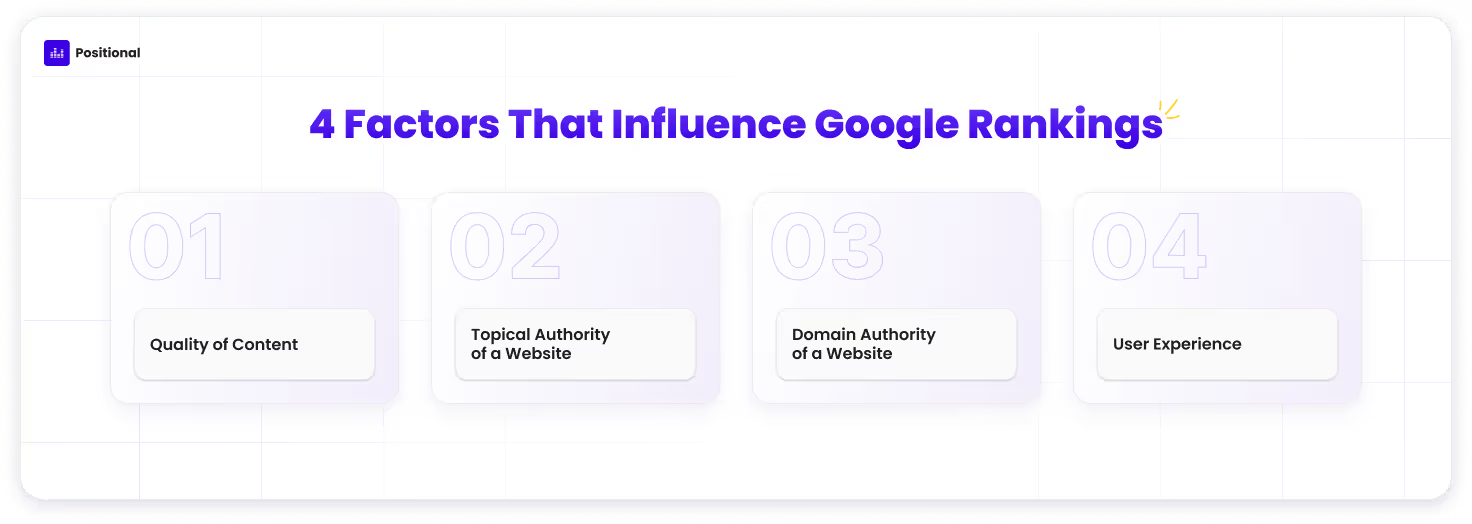
1. Quality of Content
High-quality content is more important than ever. The rise of AI has led to a “fast-food” landscape, with brands pumping out huge quantities of content to dominate the search results. This content isn’t always useful, but it has dramatically increased the competition — so much that Google announced a new update to the ranking algorithm that focuses on the writer’s experience, expertise, authority, and trustworthiness (the E-E-A-T framework).
Instead of surface-level 500-word pieces, Google is favoring longer pieces that dive deep into a topic. This was confirmed in Semrush’s study, which found that the top 10% of domains featured longer content. The average word count was 846, compared with an average of 243 words for lesser-performing sites.
2. The Topical Authority of a Website
The more you can prove that your website is an authority on a certain topic, the more weight Google will give it in SERPs. Websites that have a wealth of content that covers all aspects of a topic have a better chance of ranking in the top spots because Google deems them experts.
For example, if your website is about car insurance, try to cover as many topics, keywords, and questions related to car insurance as possible to demonstrate to search engines that your website is a true authority.
3. The Domain Authority of a Website
Domain authority predicts how likely a website is to rank well in Google. The higher the number, the better its chances. This isn’t to be confused with Ahrefs’ domain rating, which we discussed in the previous section). You can improve your domain authority by publishing excellent, relevant content and building high-quality backlinks to your website.
4. User Experience
The experience a user has while visiting your site plays a relatively large part in your page rankings. If visitors struggle to navigate your site or can’t find what they’re looking for, there’s a good chance they’ll go elsewhere. This leads to higher bounce rates and lower click-through rates, which can both negatively impact SEO.
How To Rank Faster: 5 Tips to Please the Algorithm
1. Target Lower-Difficulty Keywords or Long-Tail Keywords
Both the Semrush and Ahrefs studies proved that domains can rank faster by targeting keywords with less competition. This usually means targeting long-tail keywords that set the stage for a deep dive into a particular topic.
Use Positional’s Content Planner to research long-tail keywords. Start by entering a core term into the search bar and seeing what related keywords show up on the right-hand side of the interface. As you can see in this example, the keyword “content audit” has a high difficulty score.

However, the related keyword “b2b content audit” has a much lower difficulty score and will, therefore, be easier to rank for.
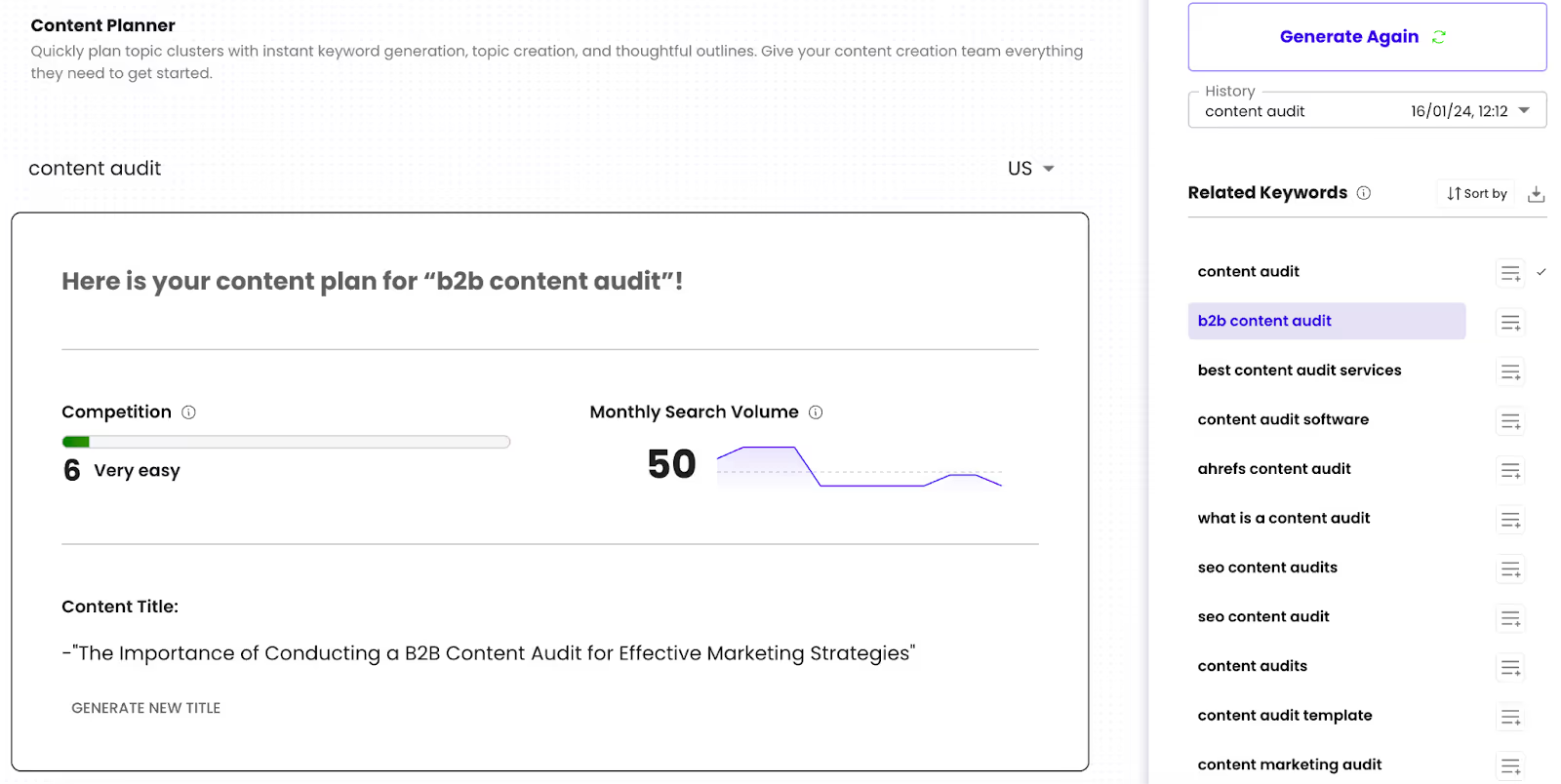
2. Create Fantastic Content
You can’t scrimp on content quality if you want to rank quickly. Google rewards content that’s useful, that demonstrates expertise and authority, and that inspires trust. It’s better to create less high-quality content than to churn out hundreds of subpar blog posts.
Make sure your content matches the search intent of the keyword you’re targeting. For example, if someone is searching with the keyword “best email marketing tools,” they probably want to see a list of tools, not a breakdown of what email marketing is and why it’s important.
Here are some other ways you can ensure your content is the best quality it can be:
- Write Good Headers: Let Google know exactly what your page is about and what subtopics it covers, with detailed, descriptive headers (and use header tag).
- Demonstrate E-E-A-T: Make your piece unique and give it more authority by interviewing well-qualified people and including relevant quotes. Alternatively, you can add your own experiences and anecdotes to a piece to make it original. Also, be sure to include an author bio and follow Google’s other E-E-A-T recommendations
- Make It Helpful: Ensure that you’re answering common questions searchers have about your chosen topic and that you’re providing value throughout. If necessary, add illustrations and graphics to highlight your key points.
- Use a Content Optimization Tool: Positional’s Optimize feature provides a list of related keywords and terms to include in your content to give it a better chance at ranking well. Other tools to consider include SurferSEO and Clearscope.
3. Build Topical Authority in a Specific Space
Google rewards websites that focus on a distinct niche and cover a broad spectrum of topics within that niche. Start small and focus your efforts on creating a number of very focused blog posts or pages on your chosen topic, and try to answer each question and address each long-tail keyword in your niche. This shows the search engines that your website is a true authority.
We recommend identifying your core topic and coming up with at least 50 subtopics to get started.
Atlassian’s blog has a vast library of content about productivity and work life.

4. Prioritize Internal Linking
Internal links provide Google with a map of your website and show how your pages relate to one another. Using links strategically sends page authority from one page to another, increasing the chances of your website ranking well in SERPs.
Creating an internal link network shows Google exactly what your site is about and can help it index your pages quickly. As a result, you’ll get out of the sandbox into the search results sooner.
When prioritizing internal linking, remember to:
- Link from your pages with high page authority to new pages to transfer PageRank or “link juice.”
- Add contextual links throughout your website.
- Add enough links: in a recent Positional podcast episode, Ethan Smith, the founder and CEO of Graphite, said he’d determined that the optimal number of internal links to a page is seven or more.
- Use a hub and spoke linking strategy to connect high-level pages with more specific pages targeting long-tail keywords.
- Ensure that anchor text is descriptive and includes keywords.
5. Build Backlinks
Building a robust backlink profile will bolster your search engine rankings. Backlinks are simply hyperlinks from one website to another, and they play an important role in determining PageRank — Google’s algorithm that calculates how helpful and popular a page is. Many high-quality backlinks tell Google that a page is a useful addition to SERPs. (High-quality links are those from websites with a high domain authority or from websites that are highly relevant to your industry.)
Here are some ways you can build backlinks:
- Guest blog on relevant, high-authority sites in your industry.
- Create helpful resource pages that other sites can link to.
- Reach out to journalists and get featured in their pieces.
- Create press releases about product launches or exciting news in your business.
- Build free tools that other websites in your industry will find useful.
Repurpose Your Content in the Meantime
SEO is a game of patience. But you don’t have to sit around twiddling your thumbs while you wait for your website to start ranking. Creating content arms you with a library of useful assets you can repurpose elsewhere. It might take six months or more for your website to show up in SERPs for the keywords you want it to, but that doesn’t mean you can’t start gaining traction elsewhere.
Take your long-form, high-quality content and put it to good use outside of your website — post it (or summaries or snippets) on LinkedIn. Turn pithy quotes or provocative passages into posts for other social media platforms. Or repurpose website content for newsletters. You can also run ads for your content to give traffic an initial boost and get the wheels in motion. This won’t necessarily mean it’ll appear higher on SERPs, but it can get eyeballs on your content straight away.
Nate regularly repurposes Positional’s blog posts into LinkedIn posts and carousels.
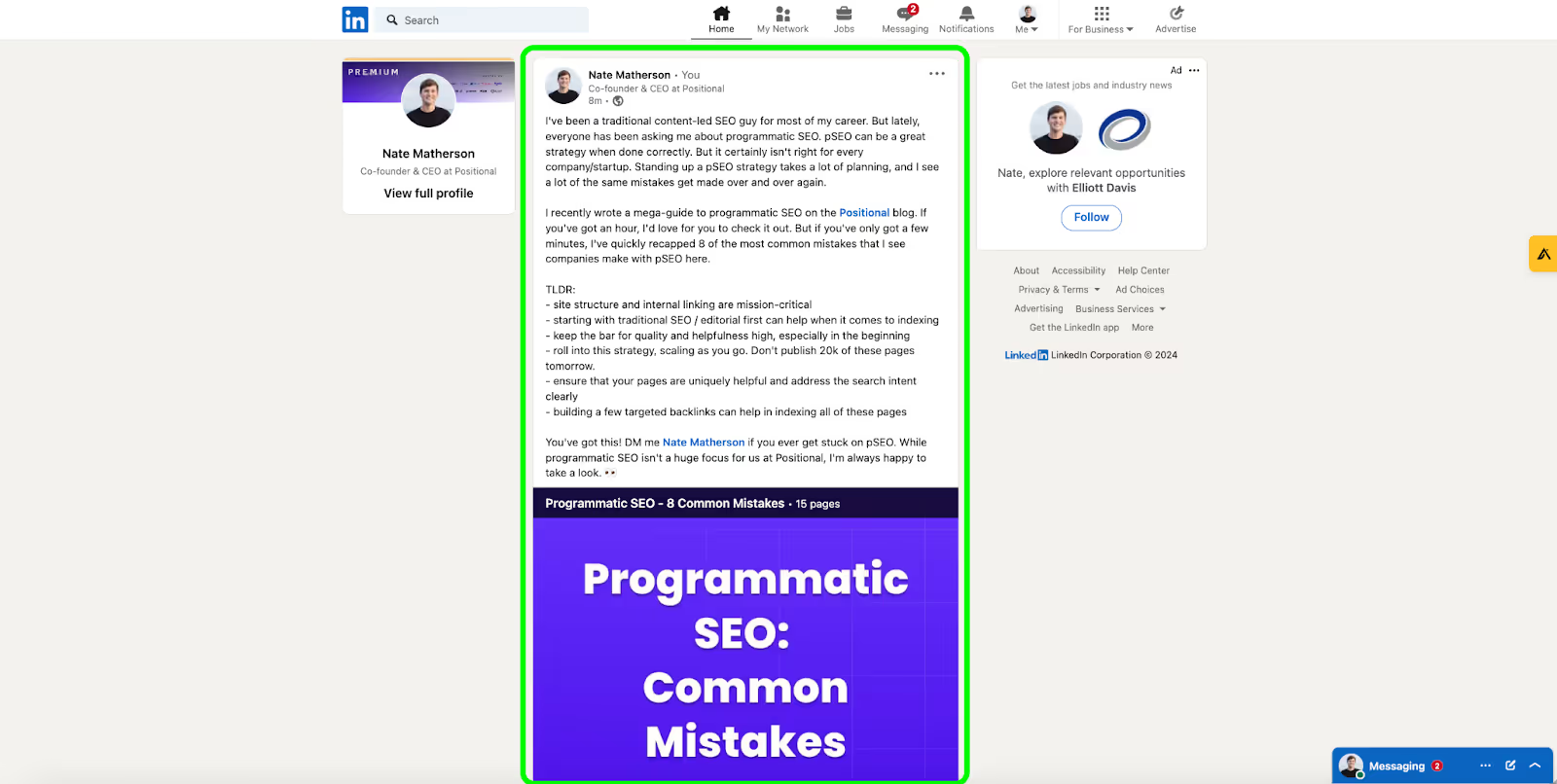
For example, this carousel takes core information from this blog post about programmatic SEO and presents it in a social media-friendly way.
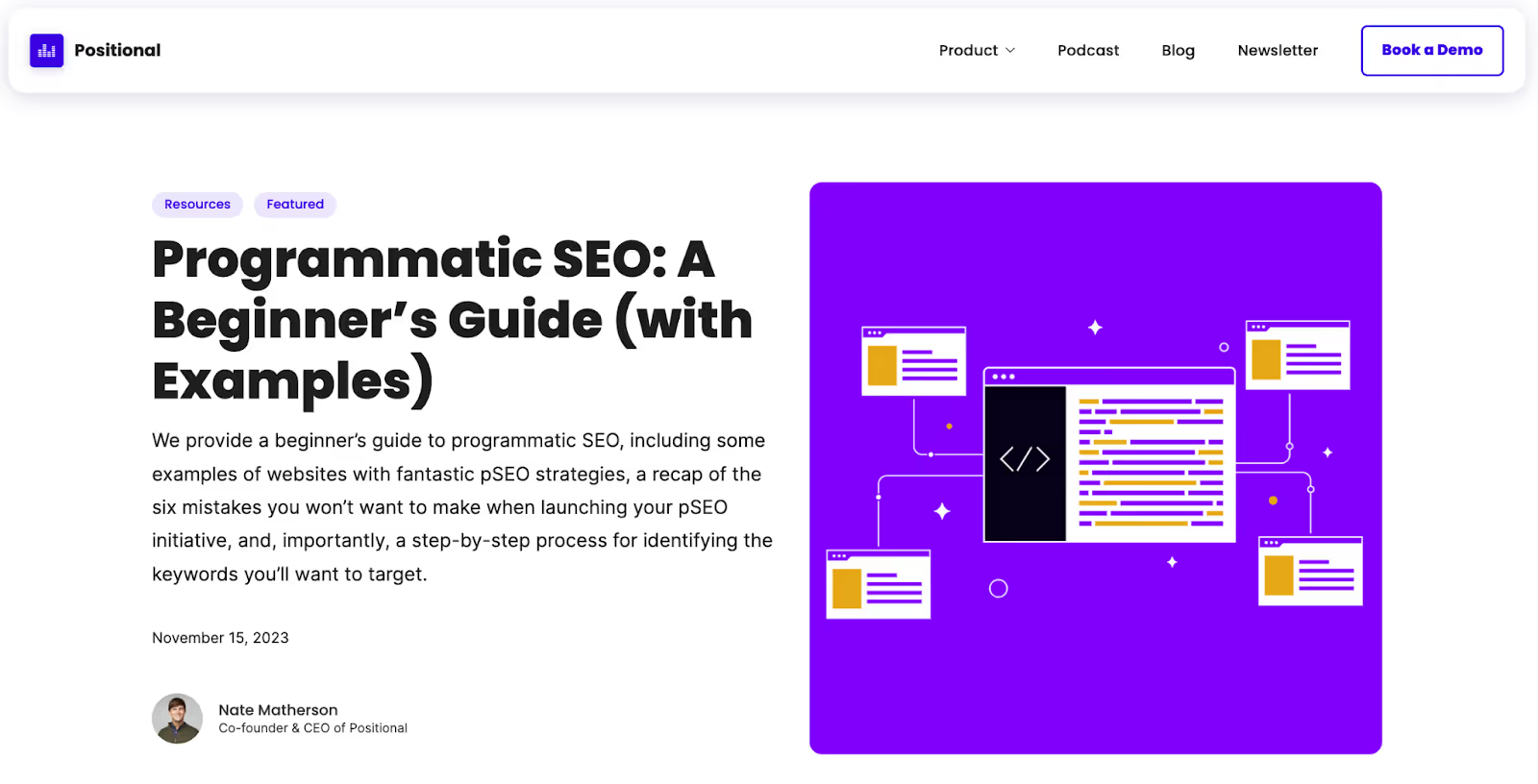
Final Thoughts
The compounding effects of SEO mean that it’s an excellent way to attract traffic and visitors to your site, but you won’t see results overnight. It can take months for content to start ranking, and that’s not including the time it takes to create high-quality content in the first place.
If you’re eager to hit those top spots as soon as possible, take your best shot by making sure that your content matches the keyword search intent and meets Google’s E-E-A-T guidelines. In the meantime, work on creating topical authority by building a large library of content on a specific topic and targeting low-difficulty, long-tail keywords. And to make the most of the content you’ve spent time and effort creating, repurpose it and share it elsewhere, too — for instance, post it on LinkedIn, turn it into newsletters, or repurpose it into a downloadable guide.
